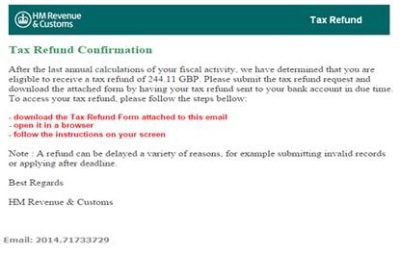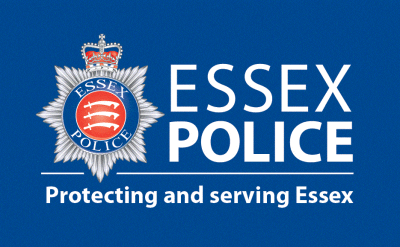November Crime Incidents
November saw absolutely NO crime report for West Bergholt after what was also a quiet October.
Information Releases
A few information releases arrived though, mostly dealing with fraud/scammers, including caution to be taken responding to phone callers trying to elicit confidential information, security companies trying to pressure sale alarm systems and a spoof HMRC email offering a tax rebate..
New ‘number spoofing’ scam nets millions for fraudsters
 A new phone scam – known as number spoofing – is netting millions of pounds for fraudsters, consumers are being warned. Financial Fraud Action UK (FFA UK) said the scam has become increasingly common in recent weeks. Typically criminals fool people into thinking they are talking to their bank, or the police, on the phone. To help gain the target’s trust, they display a fake number on the phone’s caller ID screen. They then persuade the victim to hand over details of their bank account, or passwords, or suggest that they move money to keep it safe.
A new phone scam – known as number spoofing – is netting millions of pounds for fraudsters, consumers are being warned. Financial Fraud Action UK (FFA UK) said the scam has become increasingly common in recent weeks. Typically criminals fool people into thinking they are talking to their bank, or the police, on the phone. To help gain the target’s trust, they display a fake number on the phone’s caller ID screen. They then persuade the victim to hand over details of their bank account, or passwords, or suggest that they move money to keep it safe.
Using those personal details, they then steal money from that person’s account.
Frequently it is businesses which are being targeted, as well as some well-off individuals.
There’s a big surge in criminals using this,
…said an FFA UK spokesman. He said they had seen hundreds of such cases, with some companies losing as much as a million pounds.
‘Not difficult’
When indulging in phone “spoofing”, criminals will often draw attention to the number that is showing on the recipient’s screen. Officials warn people to watch out for such odd behaviour, as it is a big clue that something is wrong.
Remember that if a caller is trying to draw your attention to the number on your phone display, it’s very unlikely the call is genuine as there is no legitimate reason to point it out,
…said Craig Jones of the FFA.
The technology being used has existed for a number of years, but fraudsters have only recently started using it.
It’s not difficult for the criminals to fake a caller ID,
… said Mr Jones.
Earlier this month some of Britain’s High Street banks launched a campaign to warn consumers about the dangers of “vishing” – otherwise known as voice phishing.
That is when fraudsters telephone victims, to try to get them to give out details of their accounts.
The campaign listed eight things a bank will never ask its customers to do, including asking for details of PINs or passwords.
- Ask for your full Pin number or any online banking passwords over the phone or via email
- Send someone to your home to collect cash, bank cards or anything else
- Ask you to email or text personal or banking information
- Send an email with a link to a page which asks you to enter your online banking login details
- Ask you to authorise the transfer of funds to a new account or hand over cash
- Call to advise you to buy diamonds, land or other commodities
- Ask you to carry out a test transaction online
- Provide banking services through any mobile apps other than the bank’s official apps.
Cold calling Alarm Companies
Stephen Armson-Smith, Crime Reduction Advisor for Braintree district, says:
There has been a rise in the number of unsolicited sales calls both on the doorstep and by telephone calls, especially to the elderly to sell alarm systems. These companies quite often make false claims and can be aggressive in their sales pitch.
Please always consider:
- No alarm system will be free or very cheap.
Beware of high maintenance fees, monitoring fees or sometimes premium rate telephone numbers are used by the system in the monitoring. - Commercial monitored alarms systems are monitored by that or another company and if it is a confirmed activation it is that company that notifies the key holder and in some cases the police.
- The police do not recommend or endorse alarm companies.
- The police do recommend that if you are having an alarm fitted that you choose an alarm system that is accredited to SSAIB or NSI.
- The police do not work in conjunction with any security companies.
- Do get more than one quote, preferably three.
- Consider joining the Telephone Preference Service to reduce the number of unsolicited telephone calls – http://www.tpsonline.org.uk/tps/ or 0845 070 0707.
- If it seems too good to be true then it probably is.
If you do received unsolicited calls from security companies contact Consumer Direct on 08454 04 05 06.
Security advice can always be obtained free from your local Crime Reduction Advisor by ringing 101.
Scam email from HMRC

We have been advised that some unscrupulous scammers are sending emails purporting to come from Her Majesty’s Revenue & Customs (HMRC). It looks like the real thing (although for those who understand English grammar, the writing is a little bit ‘iffy’), but, as HMRC say:
We would never inform tax-payers of rebates by this method or request personal details.
Please be aware of any post/emails/phone calls that offer unexpected money or ask for payment that you weren’t expecting to make, and, in particular, do not click those links or download anything you are not 100% certain about.


